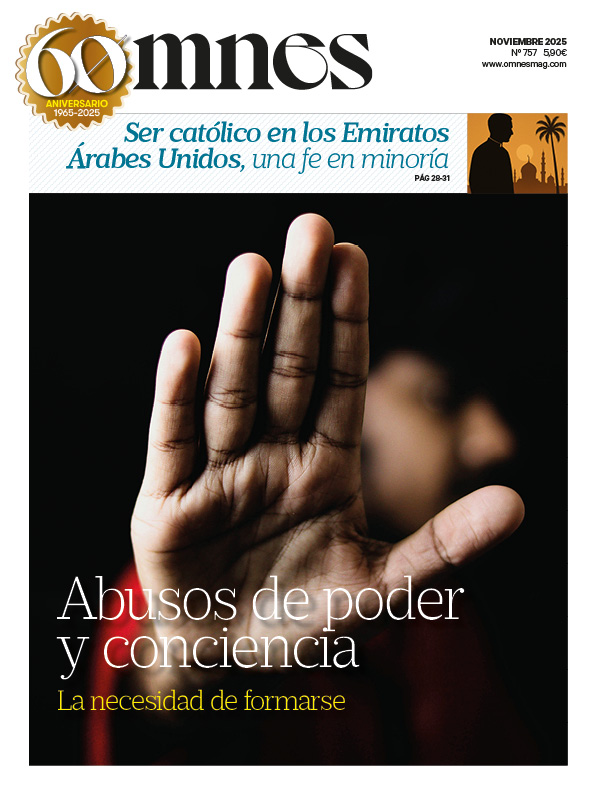In the second session of the Arteology, Abel de Jesús confided to his students that one day contemplating a work by Vermeer moved him to tears. It was a serene and profound emotion, one of those that are neither sought nor planned, but happen as a gift. The work he was contemplating was “The Geographer”. He discovered something more than a painting: the irruption of unavailable Beauty, that which does not belong to the market of taste nor to the catalog of the useful.
Vermeer's geographer is working in concentration, busily working on his map, when suddenly he looks up. And in that raised gaze there is a revelation. That's how we also live,“ says Abel de Jesús: ”in the computational, in the predictable, until a light takes us out of the calculation and reminds us that we are made for something else".
This “something else” has a name: desire. Not the whimsical desire to possess or to consume, but the deep longing that God has inscribed in each person to lead him or her to fulfillment. “What do you desire?” -Abel asks. Not “what do you like?” or “what entertains you?”, but “what do you really desire?”. For in that question, he insists, God impresses his call.
The logic of productivity
We live in the logic of arithmetic: productivity, convenience, human respect. But the Gospel - Abel reminds us - is not measured by balance sheets. Jesus did not have a productive life: thirty years of silence and three years of words. He did not found companies, nor did he leave good balance sheets, but his light continues to accompany history. He teaches us that fulfillment is not in performance, but in loving correspondence with the Logos, that principle of order, harmony and meaning that is God himself.
“The theology of the Logos,” he says, "reminds us that God does not impose what is not: he does not ask anything of you against your nature. Things are not good because God wants them, but God wants them because they are good and beautiful". This Logos is the raison d'être of the world and the heart of revelation: a God who does not act on a whim, but out of love, because his being is a loving overflow.
During the session, Abel traces the history of faith as a pedagogical display: from an eye for an eye to the forgiveness of enemies, from the temple of stone to the temple of the heart, from the distant God to the incarnate God, who becomes man so that man may recover his fullness. “The incarnation,” he says, "is not just another event, like the release of a record or a historical event. It is an eternal leap: the moment in which God enters history and history touches the eternal".
This mystery has a concrete face; the face of Jesus. In the portal of Bethlehem, the first to adore are shepherds and magi: the poor and the wise, the marginalized and the intelligent. “In them the whole world is embraced: what the world despises and what the world admires. All kneel before a Child who is God.”.
Beauty and cross
In his reading of Hans Urs von Balthasar's «The Glory», Abel recalls that Jesus not only descends into hell, but to the point where there is no faith or hope left, to redeem even that. “Death, emptiness, evil do not have the last word.” That is why Beauty and Light triumph over darkness, not because everything will turn out well, but because in the end a love that transcends us awaits us.
Abel wonders if Jesus was happy, or Mary, or Joseph. In the measure of the world, surely not. But in the measure of love, they were full. The happiness that is sold to us today,“ he warns, ”is a trap: more options, more stimuli, more distraction. But more is not always better. He recalls the village cinemas where only one movie a week was shown and we were all happy. Today there are many movie theaters in a city and thousands of options to watch on digital platforms, and we often go to bed trying to choose without deciding on one. “Seeking one's own pleasure never ends,” he says, "while giving oneself to others can fulfill us.
The cross, a scandal for some and foolishness for others, thus becomes the definitive response to the mystery of human suffering. It does not promise an easy life, but a fruitful life: denying oneself not to annul oneself, but to be filled with the Other. “God destroys our castles,” Abel concludes, "so that we may discover that happiness was not there. Even our religion can become a habit. However, grace is not forced by personal merit: it is simply accepted".
Like Vermeer's geographer, it is enough to look up. In that light filtering through the window is everything: desire, beauty, love. God's unavailable Beauty continues to call us, silently, to remind us that we were not made to produce, but to contemplate, to love and to let ourselves be transformed.
Journalist and poet.








